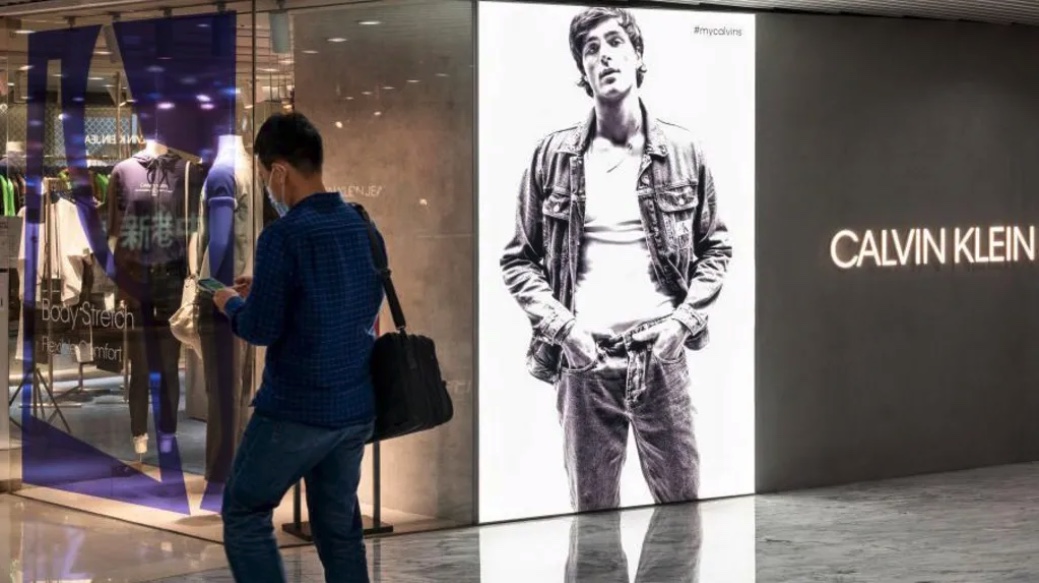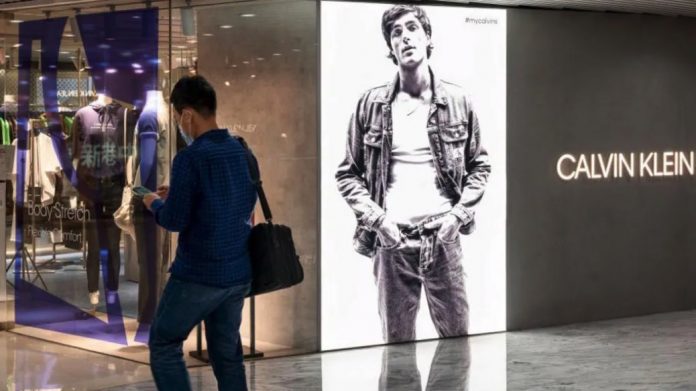จีนได้ประกาศสอบสวนบริษัทเจ้าของแบรนด์แฟชั่นจากสหรัฐอเมริกาอย่าง Tommy Hilfiger และ Calvin Klein ในข้อหาสงสัยว่า “มีมาตรการเลือกปฏิบัติ” ต่อบริษัทที่ผลิตฝ้ายในซินเจียง การดำเนินการนี้เป็นความพยายามใหม่ของรัฐบาลจีนในการต่อสู้กลับกับข้อกล่าวหาจากเจ้าหน้าที่ตะวันตกและนักเคลื่อนไหวด้านสิทธิมนุษยชนที่ว่า ฝ้ายและสินค้าอื่น ๆ ในภูมิภาคนี้ถูกผลิตขึ้นโดยใช้แรงงานบังคับจากกลุ่มชาติพันธุ์อุยกูร์
สหรัฐฯ ได้สั่งห้ามนำเข้าสินค้าจากพื้นที่ดังกล่าวในปี 2021 โดยอ้างถึงข้อกังวลเหล่านั้น กระทรวงพาณิชย์ของจีนกล่าวหาบริษัทนี้ว่ามีการ “คว่ำบาตรฝ้ายซินเจียงและสินค้าที่เกี่ยวข้องโดยไม่มีหลักฐานข้อเท็จจริงใดๆ”
PVH ซึ่งเป็นเจ้าของสองแบรนด์ดังกล่าวและมีการดำเนินธุรกิจที่สำคัญในทั้งจีนและสหรัฐอเมริกา ไม่ได้ตอบสนองต่อคำขอความคิดเห็น อย่างไรก็ตาม บริษัทได้เคยกล่าวไว้ว่ามีการปฏิบัติตามกฎหมายในพื้นที่ที่ทำธุรกิจ รวมถึงกฎหมายซินเจียงของสหรัฐฯ ด้วย
บริษัทมีเวลา 30 วันในการตอบสนองต่อทางการจีน หากไม่เช่นนั้นอาจถูกเพิ่มเข้าไปใน “บัญชีรายชื่อหน่วยงานที่ไม่น่าเชื่อถือ” ของประเทศ ซึ่งอาจนำไปสู่การลงโทษเพิ่มเติม
เมื่อวันพุธที่ผ่านมา เจ้าหน้าที่จากกระทรวงพาณิชย์ของจีนปฏิเสธว่าการสอบสวนนี้เกี่ยวข้องกับแผนการของสหรัฐฯ ที่จะห้ามเทคโนโลยีบางอย่างในรถยนต์ไฟฟ้าของจีน
“จีนจัดการกับปัญหารายชื่อหน่วยงานที่ไม่น่าเชื่อถืออย่างรอบคอบเสมอ โดยมุ่งเป้าหมายเพียงหน่วยงานต่างชาติที่มีจำนวนเล็กน้อยที่บ่อนทำลายกฎของตลาดและละเมิดกฎหมายของจีน” เจ้าหน้าที่กล่าว “หน่วยงานต่างชาติที่ซื่อสัตย์และปฏิบัติตามกฎหมายไม่ต้องกังวลอะไร”
คัลเลน เฮนดริกซ์ นักวิจัยอาวุโสจากสถาบันเศรษฐศาสตร์นานาชาติปีเตอร์สัน กล่าวว่า ยังไม่ชัดเจนว่าอะไรเป็นสาเหตุให้การสอบสวน PVH เกิดขึ้นในขณะนี้ แต่เขากล่าวว่าการประกาศนี้มีแนวโน้มที่จะส่งผลกระทบต่อชื่อเสียงของบริษัทในหมู่ผู้บริโภคชาวจีน และยังเป็นการส่งสัญญาณเตือนกว้างขึ้นไปยังบริษัทต่างชาติว่าการโอนอ่อนตามความกังวลของชาติตะวันตกอาจส่งผลตามมา
“จีนในระดับหนึ่งกำลังแสดงอิทธิพลของตนและเตือน ไม่เพียงแต่รัฐบาลตะวันตก แต่ยังเตือนบริษัทตะวันตกด้วยว่า การกระทำย่อมมีผลตามมา” เขากล่าว “ยุทธวิธีการประจานแบบนี้ ซึ่งองค์กรด้านสิทธิมนุษยชนในตะวันตกเคยใช้ สามารถนำมาใช้เป็นอาวุธได้ที่นี่”
การสอบสวน PVH เกิดขึ้นท่ามกลางความตึงเครียดที่เพิ่มขึ้นระหว่างจีนกับตะวันตกในหลายประเด็น รวมถึงรถยนต์ไฟฟ้าและการผลิตสินค้า เมื่อวันจันทร์ที่ผ่านมา สหรัฐฯ เสนอข้อบังคับให้ห้ามใช้เทคโนโลยีบางประเภทในรถยนต์จากจีนและรัสเซีย โดยอ้างถึงภัยคุกคามด้านความมั่นคง
จีนเคยเพิ่มบริษัทของสหรัฐฯ ในบัญชีรายชื่อหน่วยงานที่ไม่น่าเชื่อถือ ซึ่งถูกสร้างขึ้นเมื่อความตึงเครียดทางการค้าระหว่างปักกิ่งและวอชิงตันทวีความรุนแรงขึ้น บริษัทเหล่านั้นส่วนใหญ่เป็นบริษัทผู้รับเหมาด้านการป้องกันประเทศ เช่น Lockheed Martin และ Raytheon เนื่องจากการทำธุรกิจกับไต้หวัน
นายเฮนดริกซ์กล่าวว่าการที่จีนตัดสินใจเล็งเป้าหมายไปที่ PVH ซึ่งเป็นบริษัทที่เน้นผู้บริโภคและมีแบรนด์ที่เป็นที่รู้จักจากสหรัฐฯ แสดงให้เห็นว่าข้อพิพาทระหว่างทั้งสองประเทศกำลังขยายตัวออกไปนอกเหนือจากเรื่องการป้องกันประเทศและเทคโนโลยีขั้นสูง
“เรื่องเหล่านี้มีวิธีแพร่กระจายได้เอง” เขากล่าว “มันส่งผลต่อห่วงโซ่อุปทานที่เพิ่มขึ้นในหลากหลายภาคส่วนของเศรษฐกิจ”
ในรายงานประจำปีของบริษัท PVH ได้เตือนนักลงทุนเกี่ยวกับความเสี่ยงด้านรายได้และชื่อเสียงที่เกิดจากความขัดแย้งเรื่องซินเจียง โดยได้ชี้ว่าเรื่องนี้ได้รับ “การพิจารณาและเป็นที่โต้แย้งอย่างมากในจีน สหรัฐอเมริกา และที่อื่น ๆ ทำให้เกิดการวิพากษ์วิจารณ์ต่อบริษัทข้ามชาติ รวมถึงเรา”
บริษัทถูกระบุในรายงานปี 2020 ของสถาบันนโยบายยุทธศาสตร์แห่งออสเตรเลีย ซึ่งได้ระบุกว่าโหลของบริษัทที่ถูกกล่าวหาว่าได้ประโยชน์จากการละเมิดแรงงานในซินเจียง ในขณะนั้น PVH กล่าวว่าทางบริษัทได้ให้ความสำคัญกับรายงานดังกล่าวและจะดำเนินการแก้ไขปัญหาต่อไป
PVH มีพนักงานมากกว่า 29,000 คนทั่วโลก และสร้างยอดขายมากกว่า 65% จากนอกสหรัฐฯ
China probes Calvin Klein over Xinjiang cotton

China has announced it is investigating the company that owns US fashion brands Tommy Hilfiger and Calvin Klein for suspected “discriminatory measures” against Xinjiang cotton companies.
The move marks a new effort by Beijing to fight back against allegations from western officials and human rights activists that cotton and other goods in the region have been produced using forced labour from the Uyghur ethnic group.
The US banned imports from the area in 2021, citing those concerns.
China’s Ministry of Commerce accused the firm of “boycotting Xinjiang cotton and other products without any factual basis”.
PVH, which owns the two brands and has a significant presence in China as well as the US, did not respond to a request for comment.
It has previously said it complies with laws in the regions where it does business, including the US Xinjiang law.
It has 30 days to respond to the Chinese authorities, at which point it could be added to the country’s “unreliable entities” list, raising the prospect of further punishment.
On Wednesday, a Chinese Ministry of Commerce official denied that the probe was linked to US plans to ban certain Chinese electric vehicle technology.
“China has always handled the issue of the unreliable entity list prudently, targeting only a very small number of foreign entities that undermine market rules and violate Chinese laws,” they said.
“Honest and law-abiding foreign entities have nothing to worry about.”
Cullen Hendrix, senior fellow at the Peterson Institute of International Economics, said it was not clear exactly what prompted the investigation into PVH now.
But he said the announcement was likely to hurt the firm’s reputation among Chinese shoppers – and send a wider warning to global firms of the risks of simply bowing to western concerns.
“China is, to a certain extent, flexing its muscle and reminding, not necessarily western governments, but western firms… that actions have consequences,” he said.
“This same kind of naming-and-shaming tactic, that human rights organisations in the west have used, can be weaponised here.”
The investigation of PVH comes as tensions between China and the west have been growing on a range of issues, including electric cars and manufacturing.
On Monday, the US proposed rules to ban the use of certain technology in Chinese and Russian cars, citing security threats.
China has previously put US firms on its unreliable entities list, which it created as trade tensions heated up between Beijing and Washington.
Those firms were major defence contractors, such as Lockheed Martin and Raytheon, over their business in Taiwan.
Mr Hendrix said the decision to target PVH – a consumer-facing firm with a clearly recognisable US brand – showed the two countries’ disputes were widening beyond areas such as defence and advanced technologies.
“These things have a way of spilling over,” he said. “It’s affecting a growing number of supply chains across different sectors of the economy.”
In its annual report, PVH warned investors of revenue and reputational risks stemming from the fight over Xinjiang.
It noted that the issue had been “subject to significant scrutiny and contention in China, the United States and elsewhere, resulting in criticism against multinational companies, including us”.
The company was named in a 2020 report by the Australian Strategic Policy Institute that identified dozens of firms that were allegedly benefiting from labour abuses in Xinjiang.
At the time PVH said it took the reports seriously and would continue to work to address the matter.
PVH employs more than 29,000 people globally and does more than 65% of its sales outside of the US.
By Natalie Sherman, BBC News

















